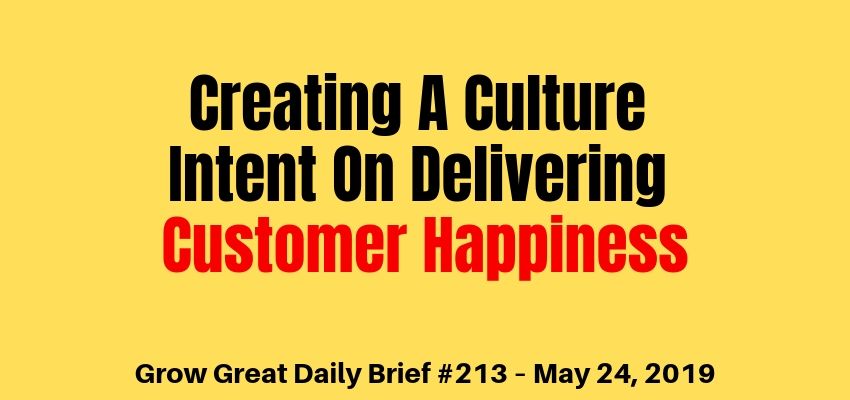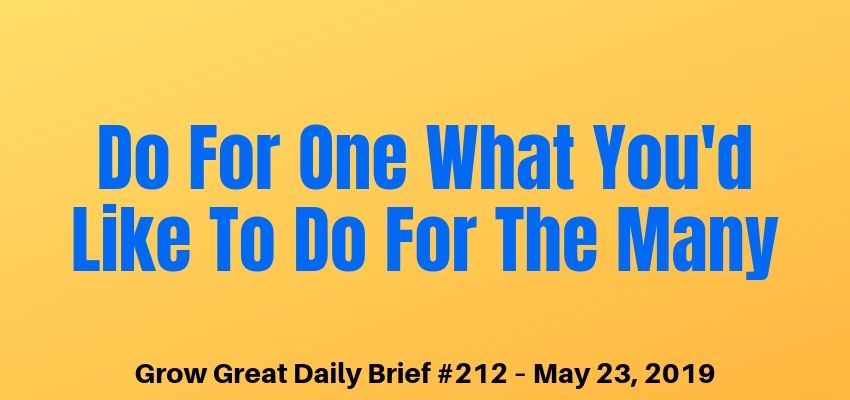Freedom To Grow – Grow Great Daily Brief #217 – May 30, 2019
Podcast: Play in new window | Download (Duration: 8:09 — 9.8MB)
Subscribe: Apple Podcasts | Spotify | RSS | More
Let’s put the G on the end of LUG – learn, understand, grow. Today we continue this series on freedom since Monday was Memorial Day here in the United States. The freedom to grow!
Growth has pains. But that doesn’t make it bad.
When I was young I had leg aches. My dad would come into my room at night and rub alcohol on my legs so I could sleep. I remember the leg aches, which were growing pains. It didn’t last long, but it was the price my body paid for my physical growth. I’m sure my parents would have been very concerned if I didn’t grow as they expected. Thankfully, I did grow. In spite of those pains.
Growth is such a big topic that no single episode could possibly do it justice. That’s why this podcast is devoted to the subject of growth and not just any growth — but the work we need to put in if we want to grow great. And great isn’t for me to determine for you, or for you to determine for me. It’s individual to each of us. I simply want to be a voice to encourage all of us to do our best to reach whatever potential we have. Nothing wrong with chasing an ideal – specifically the ideal version of ourselves.
Today’s topic is exercising the freedom we all have to grow. The thing that jumps out at me when I consider this notion is belief. So many people don’t believe they have the freedom to grow. They think they’re restricted or limited in some way. Their circumstances, their situation and whatever else they can point to prevent them from growing – prevent them from improving. And that’s what we mean we talk about growing. Improvement. Change for the better.
Do you ever wonder why a person with every visible advantage falters and can’t seem to find their way while another person with no apparent advantage figures out a way to soar? Puzzling, right?
I can overly simply it to one thing – belief. One person believes they have the freedom (and therefore, the ability) to improve. The other doesn’t believe it, or they have doubts. It’s the power of freedom and realizing it’s REAL.
Yesterday I mentioned the parable of the elephants with the ropes around their legs. It’s such a simple, but a powerful lesson for us in these issues of freedom to learn, understand and grow.
Popeye was the first I heard say of himself, “I am what I am.” Well, you’re not Popeye and neither am I. It’s a flimsy excuse for failing to change – improve and grow.
Do you know the enemy of this and other freedoms we’ve talked about this week?
Acceptance.
Put another way, complacency. Apathy. Indifference.
We tend to accept things about ourselves as truth – our reality. But the worst part is we accept these things as permanent when they’re only temporary…if that’s what we decide.
Let’s have some fun and engage in some mind games – some thinking games!
Think of a person you really admire. I don’t care what you admire about them, or why. Aim as high as you want. Go for a famous person if you’d like. I don’t care. Got somebody in mind?
Focus on what you most admire about them now. Again, it doesn’t matter what it is. Or why you admire it. But think of the trait or characteristic they have that you most admire.
Now for the fun part. Imagine that you’ve got that trait, but you’ve got it to such a degree that they’re doing this exercise thinking of YOU. As good as you think they are in that thing, imagine that you’re even better! So good in fact, they’d love to be as good as you.
Imagine what life would be like. How would you feel? How would you behave? How would your daily actions be different? Keep doing this. Give this some serious thought and really engage your imagination!
Unless you’re thinking of some world-class athlete (physical prowess is required and let’s face it – we don’t all have it)…or a world-class physicist (intellectual prowess is required and let’s face this, too – we don’t all have it)…you’re likely thinking of somebody with an ability that’s not superhuman. I did tell you that you’re not Popeye, didn’t I? Well, you’re not Spiderman either. ‘Cause my almost 4-year-old grandson has dibs on being Spiderman! 😀
We mock dreaming and it’s pathetic. Dream more. Dream about what your ideal self looks like. What’s different about your ideal self from who or what you are right now? Why ACCEPT that gap as your final destiny? Why ACCEPT that you’ll never be closer to that ideal than you are right now? Who made that rule and imposed it on you?
Look down at your legs. Is there a rope tied around one of your legs? Then you’re free to grow.
Stop accepting the status quo as the last chapter of your book. Today is a chapter. Your reality is what it is, but that doesn’t mean it can’t change. Our past is our past. We wrote those chapters already. They only impact future chapters when we refuse to embrace the freedom we have to grow and write whatever chapters we want for our future. Combined, they’re chapters that make up the story of our lives. So while we’re still alive let’s get busy writing the best chapters possible.
Learn. Understand. Grow. And let’s craft chapters that show all that improvement.
Be well. Do good. Grow great!
RC
Freedom To Grow – Grow Great Daily Brief #217 – May 30, 2019 Read More »





